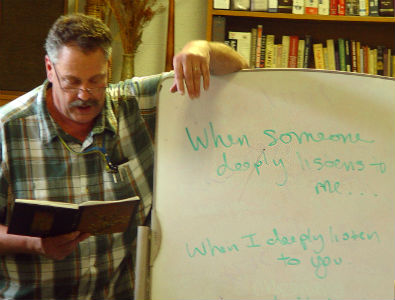
English
The purpose of this course is to write your way toward the true core of life as you and only you can see it. The psychologist, Abraham Maslow calls this core experience of life "self actualization"—a flourishing of vitality, creativity, self-sufficiency and authentic purpose. A meaningful life. The poet, Clayton Eshleman, in a piece called "Bearings," urges us "to think of meaning as that which you can utter, which you can express, for if you can, having digested it, you are creative." He urges us to "digest" and create something from experience, and he urges us to do that with the full awareness that we often fail.
When we hide our creativity from ourselves and others we fail. Ultimately, we derail. It shows up in the ways we think and in the ways we act—in thoughts and deeds that take us away from our authentic purpose. None of us wants to derail. We may not even know THAT we have derailed, which is tragic, really and troubling for everyone. The only thing worse is not wanting to know how or why you've derailed—to be incurious, indifferent, and ultimately ignorant. It's not just you that suffers in that scenario. The rest of us suffer, too. Without your conscientious striving for something better how can we make a better world? To Eshleman that better world can be summarized in an old fashioned word. He calls it "paradise"—or a word that suggests the utmost of our longing and desires for ourselves and others." We write not just for ourselves, then, but for others. We write to share the same paradise, the same life.
Through our communal writing practice and discussion of other writers, we will bear witness to the problems we see in our lives and in life. We will share our diverse experiences and together envision a world we can share that is more humane, more accommodating, more generous and sane; a world where there is less derailing, less crime and less pain. To do this, we will need to wrestle with the paradox at the heart of writing and social change; the burden of becoming a writer—becoming honest, creative and responsible with words and, presumably, the corresponding deeds—while struggling with the forces in jail and "out there" in society that would subvert our courageous choices.
I’m growing in every class and I’m honored and humbled to be able to participate in an environment with such great open minds that are interested in making the best of our situations.
Isreal Shaw, RCJ Resident
